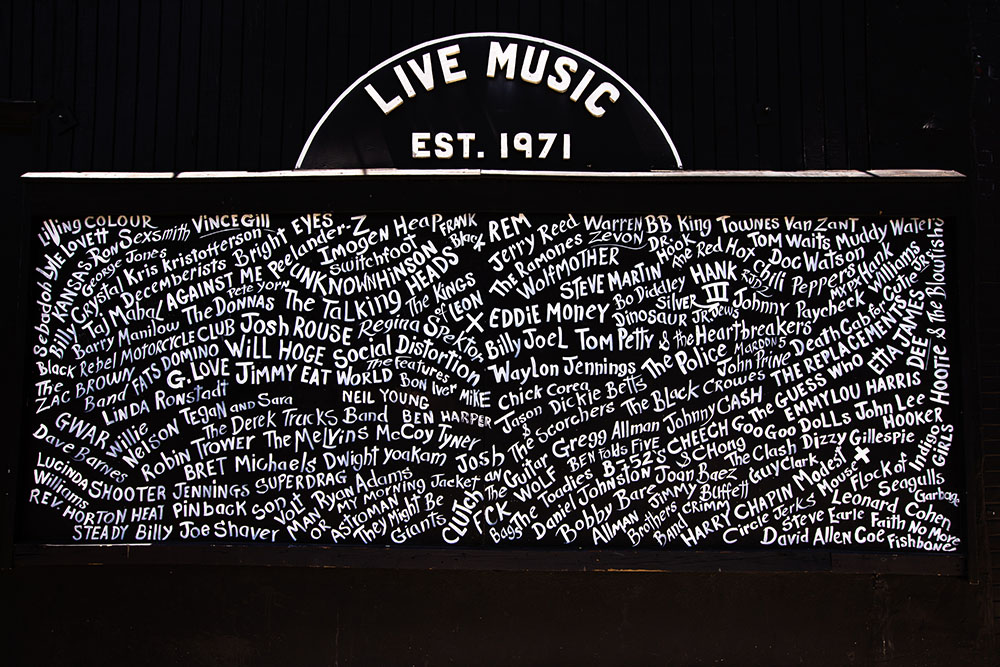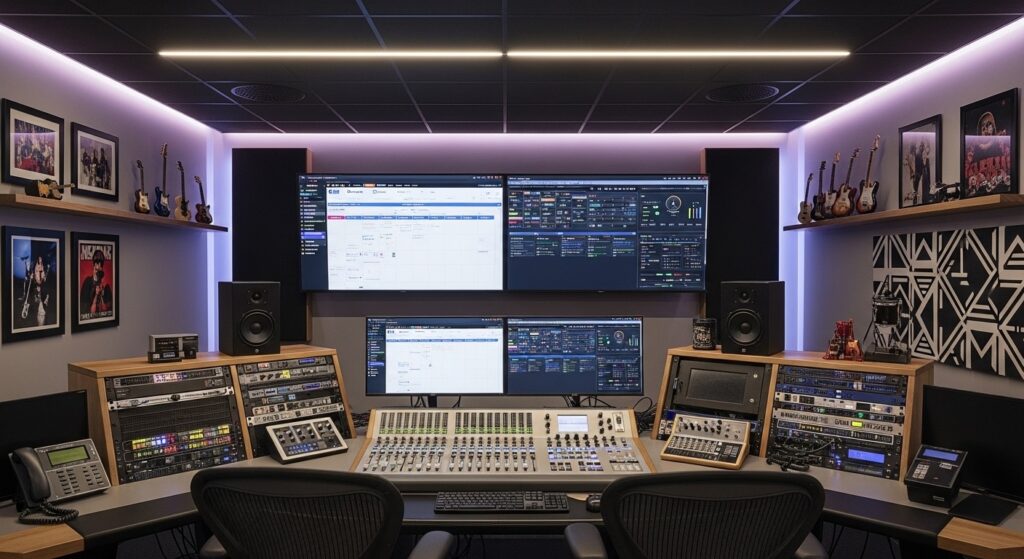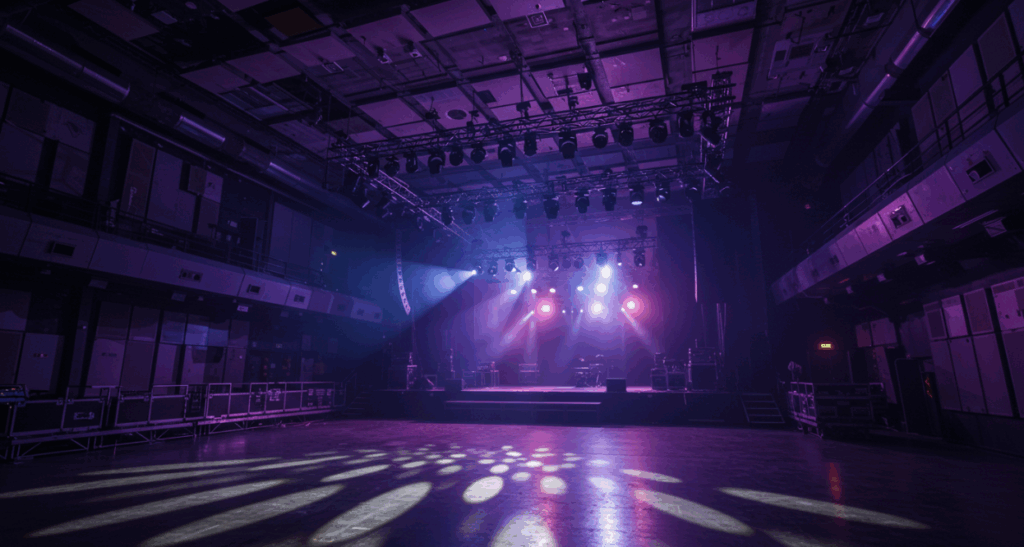
Interview with EXIT/IN Nashville on Thriving and Surviving During COVID
One of the hardest-hit industries during COVID-19 has been the live music industry. Experts estimate as many as 90% of venues will close because of the pandemic. Still, many venues are doing whatever it takes to survive and learning that survival has some silver linings.
We sat down with Chris Cobb, owner of EXIT/IN, an iconic, independent Nashville venue that has hosted thousands of incredible shows since 1971, to ask him how things have changed in his world since COVID.
Tell readers a little bit about EXIT/IN and what you would be doing right now under normal circumstances.
We are a 49-year-old, independent music venue in Nashville, a classic, old black box rock and roll room with great sightlines and sounds, and an open floor with standing room only. If we weren’t dealing with COVID, I’d be booking and producing Live on The Green, a free, outdoor concert in Nashville. This would have been our twelfth season. Post-COVID, I’ve been deep in the National Independent Venue Association (NIVA) and Music Venue Alliance (MVAN), both of which are bringing awareness to independent music venues and helping music professionals survive through programs like Save Our Stages (SOS).
How did you get into live music?
I started listening to music as a kid because my dad is a big music fan and we always had it on in our house. I think I was introduced to Pink Floyd at age four. I’ve been playing in bands since middle school, moved to Nashville at 18 to go to Belmont for a music business degree, promoted small local shows, and took every job I could get. I now play with my son.
In Nashville, you were dealing with tornadoes just before COVID hit in early March. What was that like?
It was bizarre and scary, but we’ve been through it before. Our community has fought through several natural disasters (the tornado of 1998 and the flood of 2010). We come together, fight and rebuild. Thankfully, all of us at Exit/In were okay after the March 2020 tornado outbreak, but then the madness of booking took over for a couple of weeks. Just two weeks later, COVID hit.
You picked up some shows that were going to happen and then complete shutdown. What happened?
We picked up 20 shows in 10 days. That was 20 shows on top of an already full calendar. We were looking at no days off until the end of June. We were going to be the busiest we had ever been for spring and summer. Then March 15th, the mayor shut down bars due to the virus and we had to pull events. We had a wrestling event in the club that afternoon and that was the last live event since. We thought it would be a short-term blip on the radar and here we are seven months later and still closed.
MVA Nashville sprung up pretty quickly. How did that come to be?
We actually formed the organization years back because of concerns with the playing field becoming increasingly unlevel for independent players. We knew we needed to organize so we could have a seat at the table with major corporations who were taking over our Nashville market. We didn’t do much with MVA (Music Venue Alliance) between forming it and COVID, but we had that groundwork in place. As an effective advocate for music venues, there is no way we would have made it this far without it. None of the 15 independent venues would still be open without the alliance to use as a tool to secure capital for all of us. The model has been replicated across the country and we Zoom with a formalized group of local organizers within NIVA every Tuesday. It’s a huge information dump with everyone supporting each other.
What was the start of NIVA (National Independent Venue Alliance) like?
It was a whirlwind. I was aware that townhalls were taking place, which was born out of Independent Venue Week. It helped create a platform to get everyone together. EXIT/IN was one of the original five or six venues in NIVA, and now there are over 3,000. It went from nothing to getting legislation in the relief bill.
90% of venues are in danger of closing when you you look at the national scene. How did you secure some funding in your local area?
We petitioned the city mayor and city council and got legislation passed to create a $2M grant program for NIVA. A third-party fiduciary is in charge of the grant process, taking in applications and distributing funds.
How has COVID changed things for the EXIT/IN team?
Our daily work is unrecognizable compared to what it was previously. We went from an average of 20 shows every week to closed indefinitely. We’ve had mass layoffs, having to let go of 50 event staff in late March. We then cut our full-time team when we realized that the PPP program wasn’t going to be a grant but a loan we had to repay. EXIT/IN was reduced to only three people who wear many hats.
It feels like we are in startup mode and I typically love the startup mode, but this has become more survival mode. I look at it in two-month clips – do we have enough money to get through two more months? If yes, I roll the calendar forward. If no, then it’s what can we do? We’ve been doing live streaming. There are artists in Nashville that need to connect with fans and want to put out content, so we help with that.
How quickly did you pivot to live stream?
We started working on it almost immediately, at the end of March. We contacted Comcast the week of the pandemic before things closed. Early on, we were trying to figure it out, having conversations with artists and managers. It took two months before we were ready to actually host our first stream. Now, we have done 25, but we’re still figuring it out.
Some are doing ticketed livestream, some straight to Facebook stream. What works for you?
Streaming is complicated. We are analyzing a subscription model, and some venues have made that work. If you can get the viewers, you can monetize through YouTube, but you have to get A or B+ talent to get the viewership. If we can just break even, we’re happy because we can put people to work. We want to be ready to add it as an ancillary revenue stream when all of this is over.
I wish we had a plan, but we don’t. We want a stage to host up-and-coming artists because it’s a part of what we love to do. We don’t want music to only be accessible by the elite. When regulations tell us only 100 tickets can be sold for a room that holds 1,000, tickets are $250. We can sell stream tickets for $10, but that only covers our costs.
On putting people to work – production and floor managers, box office managers – they got into the industry because of their passion for music. Any tips for leading your team through this?
It’s tough. The three of us (remaining core team) meet once a week on Zoom and are in constant contact through texts. For us, it’s just being cognizant of the outside factors at play. Our COVID best is not our pre-COVID best. I like to achieve, accomplish, set goals and exceed them, and beat the timeline, so personally, it has taken work to be okay with fact that we will miss our goals constantly right now.
You have to be flexible and understanding that there are a lot of people having a hard time not just financially but emotionally, too. It’s a hard world we’re in right now and we just have to do our best.
Our extended team doesn’t exist anymore, unfortunately, but they will always be in our family and we love them. We collect and share resources with them, like aid, grants, and gift card programs. We set up a Go Fund Me early on, but people are exhausted with giving.
How have the locals in your area been responding to and supporting EXIT/IN?
Support for EXIT/IN is unbelievable in the community. After 49 years, there’s a lot of love. The hardest part is finding actionable items that are impactful for people. We have such a huge problem financially – a $20k per month problem, and we are a small room. You can imagine what it’s like for larger rooms to stay closed. You can only ask people to give so much. Frankly, we just need money and legislation to pass.
With reopening guidelines and what Nashville has put out there from the beginning, where do you stand now? What is allowed capacity, is it viable and when will you go to the next phase?
Being open is one thing and making money is an entirely different thing. In Nashville, the current phase we’re in allows for 150 people or 30% occupancy, whichever is less, and no one can be within 15 feet of the stage unless we install a plexiglass barrier.
There can be no bar service from the bar. Everyone has to be seated with table service. For our small venue, that translates to 25-30 people we can seat. For EXIT/IN, it’s more financially sound to stay closed than start back up for 30 people with a limited number of shows. We need to be able to operate 15 shows a month at 50% capacity just to break even. That’s how thin the margins are.
I stopped trying to guess things in 2020, so I have no idea when we will get there. My goal is to keep bringing in enough money to get us through Labor Day of next year, where we may be able to operate at some sort of pre-COVID semblance. I plan for the worst and hope for the best.
You’ve done a few live streams, hosting SOS Fest just last week. What was that like to be part of a live stream in your room and a virtual festival at that caliber?
Unbelievable. It was the best four hours of streaming I’ve ever seen and it was an amazing experience from the beginning. From booking to custom poster and screen print for every performance. I always love watching art come together during the creative process and being able to employ local artists was great.
The actual production process was incredible and showed me there is a way to do what we do safely. The bar was set on COVID protocols and how to do things right. There were no fans in the building, but even putting a production crew of that size into place required a lot of safety measures. It gave me hope there is some way to do things during COVID. It may not be easy or cheap, but there is a way.
We’ve seen similar things from venues and promoters, and livestream has been talked about at SXSW and other conferences that it would take off. Is there a company you go to for streaming or are you trying to figure it out?
It feels like we’re in a good place to date and not get married right now. There are so many options and we’ve had great experiences with a few companies. I like Big Room’s technology and its automated director mode because it rolls back the cost of producing and allows us to put more local bands on stage. Single Music is a Shopify plugin and we can bundle merch with streams for added revenue. Our merch sales are up 300% since COVID.
We aren’t in a long-term contract with anyone, though. There is some cool stuff coming in that world. We have our eye on it and want it to align it with our goals and values as a venue and a brand.
What are some of the things you’ll start to do to prepare for reopening? How will shows look different?
Honestly, I don’t know. We put rigorous COVID protocols into place as soon as we had the opportunity to stream and film, such as temperature checks, screening and documents signed before you can enter the building, sanitizer, masks, and social distancing.
The way I’m looking at it is backward from most people. We will keep doing streams and learn how to rebuild from that foundation. Instead of just reopening, we will slowly add a small number of people into the building to stream and build from there. I want to organically grow and rebuild from the bottom-up, and right now, the bottom is a 10-person artist and crew filming. We will eventually add some guests, then maybe start adding paying people, then build and grow from there until one day, we have full-capacity shows.
How will offers change? Artists want guarantees or door deals. How will that adapt?
I wish I knew. Our policy is “no guarantees” right now and I don’t know when we will offer them again. The way we normally build offers is based on whatever expertise and market history we can access, and right now, all that is out the window. Any typical way to determine what an offer should look like is off the table. It’s back on the artists’ side and I’m excited to see more independent agencies open up. That’s the silver lining.
I’m focusing on making sure my relationships are tight with the people they should be tight with. I don’t know when we’ll be back to 400 shows a year, but we can start with building quality relationships.
Alongside NIVA starting out, there was NITO (National Independent Talent Organization) how have these come into the fold with what independent venues are doing?
Like I said, as far as indies go, COVID has been a silver lining. At least everyone is working together for the first time. I always thought we should help each other out, but we are all busy and there was competition. It wasn’t a level field. The future is extremely bright for the independents in our industry on any side as long as we can get there. When we do, it will be unbelievable – a more united independent industry.
Austin has lost at least four venues so far. What about Nashville?
The Douglas Corner Cafe – open more than three decades and no one thought it would ever close. That’s what kicked us into gear to get NIVA started. We don’t want to see more close.
Will streaming last?
To some extent it will. The floodgates are open, and I don’t think they’ll all close. It will be interesting to see what it will look like and who will control it. Will artists or venues control it? Will venues do a lot of work and not make a lot of money?
I have a 13-year-old, and I think he’ll be used to watching shows on his phone and computer. My son’s first show is on Twitch. Imagine the experience and his perspective on where that will carry forward.
Nashville has a lot of artists living there, making it easier to book shows. How can you leverage geographical advantages?
Do Outdoor shows, even in your parking lot when you can. Living somewhere with artists is a great advantage, especially through marketing. We make sure we market the space as a prime location for artists to come do what they want to do. Even with the pandemic, they are still going to be releasing new content and videos. Bands still need to connect. If you have a venue, you have an opportunity to monetize your space – renting your room to artists to create the content they want to create. But you have to spend the money to make it look good and promote it to as many managers, agents and artists as you possibly can.
For the full recording of the conversation, head to our Facebook page and check it out: A Conversation with Chris Cobb of Music City’s Exit/In

Matt Ford is the founder and CEO of Prism.fm, an Austin-based software company revolutionizing live music event management. With a background in entrepreneurship and a degree from the University of Wisconsin-Madison School of Business, Ford combined his self-taught coding skills with firsthand experience as a concert promoter to address the inefficiencies he observed in the industry. In 2018, he launched Prism.fm, an all-in-one platform designed to streamline operations for venues, promoters, and agencies by replacing cumbersome spreadsheets with integrated tools for booking, financial tracking, and contract management. Under his leadership, Prism.fm has grown significantly, achieving $3 million in annual recurring revenue post-COVID and securing over $15 million in funding . Ford’s commitment to building user-centric solutions has positioned Prism.fm as a trusted partner for over 1,500 venues and promoters worldwide.



